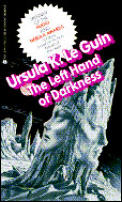
| Publisher: | Ace |
| Copyright: | March 1969 |
| Printing: | 1976 |
| ISBN: | 0-441-47812-3 |
| Format: | Mass Market |
| Pages: | 301 |
Le Guin writes a very intellectual style of science fiction (and fantasy), well suited for critical analysis, and The Left Hand of Darkness is no exception. One could doubtless find multiple critical essays and analyses of this science fiction classic, going into considerable depth on its themes and implications. Amidst that background, a simple review seems a bit superficial and crass, but here it is anyway for those curious about my opinion of it as a story.
Le Guin's writing seems quiet and still to me, like focused light, keeping the scenes in front of the reader's attention long enough to allow a comprehensive look. The Left Hand of Darkness, despite being a story of both political intrigue and adventure, is not paced at all like a thriller or adventure story. It is, instead, a tour, albeit one told as a story, of a society both alien and familiar and a world both beautiful and forbidding.
Winter, the Hainish name for the world on which The Left Hand of Darkness is set and called Gethen by its inhabitants, is still locked in an Ice Age, with short, wet thaws and long, horrible winters, constantly full of snow and ice. It is also a world of otherwise human beings who are neither male nor female except during a short time of the month, during which they can become either sex. It is a long-lost outpost of humanity, left to itself for many thousands of years to develop its own culture, its own traditions, its own government, history, and mythology.
The story is a first contact story, told primarily from the perspective of the Envoy sent from the loosely allied worlds of the galaxy to invite the inhabitants of Winter to join in their coalition. By tradition, this first Envoy is sent down alone, providing the reader with a viewpoint character, a distanced observer who needs to explore the planet's culture and yet finds it different and alien. Most of the book is told from his first person perspective, mixed with accounts of legends and myth from Winter's mythology and the occasional journal entry from one inhabitant of Winter the Envoy meets.
This is not a book to thrill you with intricate technical descriptions, glimpses of far-future technology, or rousing adventure stories. (It has aged remarkably well, in fact, due to the lack of reference to much specific technology.) I found it to be a bit of a change of pace, and it took me a while to become absorbed by the background. The more one reads, however, the more one gets a sense of the world as a world; the pieces feel like they fit together, the differences are subtle and consistent, and it stood up well as a completed whole. The Eastern religion varient, Handdara, that is woven into the story fits the world quite well, and is interesting in its own right. I'm not sure I'm convinced by the extrapolations Le Guin makes, but I found them thoughtful and thought-provoking.
Rather than throwing a barrage of ideas at the reader, The Left Hand of Darkness presents just a few and then explores them in some depth. There are sections heavy with description, and I felt like the book dragged in a few places, but it was well worth reading.
Reviewed: 2004-10-22